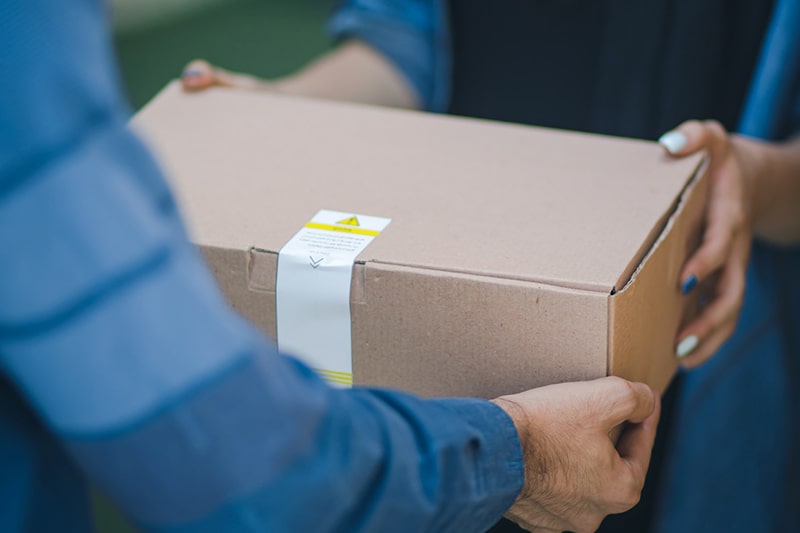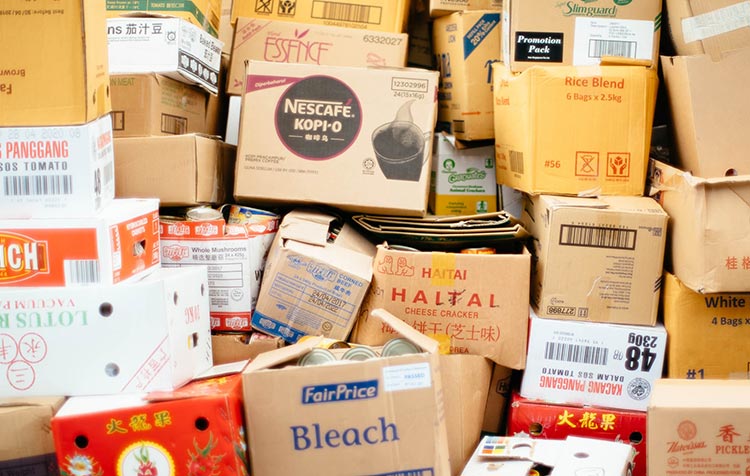You're wondering how to be a customer or a salesperson who is very consciously Avoid returns can? Then you've come to the right place. Because in times when we have all kinds of nonsense delivered to our homes, it's important to take a look at the sense and sustainability of the countless returns. Shipping is never costless and certainly not without consequences. We need to understand that. The good thing is that we all have the chance to put an end to the returns madness.
In this post, I want to show you why we urgently need to learn to avoid returns - and how you, as a customer and seller, can consciously contribute to this.
Here is another short Table of contents for you:
Why is it important to avoid returns in the first place?
The answer to this question is also my main reason for publishing this article. The following Facts and figures on returns should make it clear to each of us why we should learn to consciously avoid returns:
- 280,000,000 package returns: That's how many returns there were in German online retailing alone in 2018. Around 487 million items were returned to the retailer with the returns.₁
- Greenhouse gas emissions: Returns by German online retailers in 2018 resulted in approximately 238,000 metric tons of CO2 emitted, although this is avoidable. By way of comparison, this corresponds to around 2,200 daily car journeys from Hamburg to Moscow. Problems like the global warming are thereby exacerbated.₂
- Goods are damaged: Sending them back and forth damages many products and their packaging so that they can no longer be sold.
- Return Destruction: Even though many retailers sell the returned goods as new or B-goods and donate products that can no longer be sold, around 20 million returned items still end up in the trash.₃
- Shipping boxes too big: In addition, retailers often use only a few carton sizes in order to automate better. But does a small soap really have to be shipped in a 30x40x40 centimeter carton? Does it even need to be shipped at all? In any case, the large carton costs space, money and an unnecessary amount of packaging material.
- Waste generation: Online orders produce a lot of waste. Whether cardboard, plastic pads, shipping labels or adhesive tape. In the spirit of the Zero Waste Lifestyle great potential can be seen here.
- Respect: Ultimately, however, it's about respect for others, such as the letter carrier - who is usually poorly paid for this strenuous job.
Notice: Incidentally, items of clothing are the most frequently returned items in Germany. Around 50 percent of clothing and even up to 70 percent of shoes end up back in the box.₄
As an environmentally conscious customer, how can I avoid returns?

Both from a financial and environmental point of view, it is desirable, Avoid ALL shipping orders if possible. Is the purchase really necessary or rather nonsense? Can I perhaps also get the article offline in the store around the corner with personal advice? Questions upon questions. And yet the basic rule is super simple: only when an online order is appropriate and no alternatives are available, should an order be placed.
If ordering online is absolutely unavoidable, then you can use the following 10 tips to get a little more live more sustainably:
1. read product description carefully
If you want to avoid returns, then you should read the descriptions of the dealers very carefully. Helpful are also answers from dealers to the Questions from other customersas you can see for example on many product pages or also on the FAQ's of the provider. In this way, you can avoid unpleasant surprises, as well as return shipping and reordering.
2. accurate size information
Since many returns occur because, for example, clothing does not fit, you have great potential here to avoid returns even before the order. Give your exact, actual size and also make sure before you click on "Order now" once again that the right size selected is.
Notice: A Munich-based StartUp (presize) is currently working flat out on an app that allows you to determine your ideal size via smartphone.
3. read reviews and testimonials
With Product reviews you have to be careful, of course. But you can also quickly see whether a shoe is rather larger or smaller or whether the ordered Push up grips wood are really as good as you would expect them to be. Also with experience reports from Blogs or YouTube videos you can find out more about products on the Internet.
4. mail to the provider
Yes, I know. Everything has to go fast - including online shipping. But so much time must beif you want to avoid returns as a customer. If you have a question about the product, ask the supplier. You might even get a reward in the form of a coupon code.
5. shipping is never without cost and consequence
Please make yourself aware of this. Someone always has to pay for shipping - even if you as the customer are often not the one. In addition, each return generates avoidable CO2-emissions that are driving climate change and, for example, in many places are responsible for Water Shortage or Species Extinction provide.
6. legible name on the mailbox
It can be so simple. But many returns actually occur because the recipient's name is not on the bell plate or mailbox. Please make sure and at the same time attach a sticker with "Please do not post advertising". This is again very much in the spirit of the plastic-free life.
7. accept packages for neighbors
If you want to avoid returns due to the absence of the recipient, you should also accept packages for your neighbors. Someone will do that for you. So do something for the Sense of community in your neighborhood.
8. return only for good reason
I once received a return because the product packaging was a little "dinged" on one corner. Crazy when you consider that an order is actually about the product. My recommendation: if you are going to return, then please do it sensibly and with a subsequent learning effect for future online orders.
9. go shopping instead of bulk orders
End with "Zalando Parties" and end with "Purchase on trial". The free shipping and free return options are tempting, sure. But this is simply anything but sensible and sustainable. Please only order the things that you really need - and go store in store, if you absolutely want to try on many things.
10. questioning
Question whether you really need products as soon as possible or whether you can wait a little longer. Through Collective orders you can already basically avoid unnecessary double shipping. From my own experience I know: only a few things you really need super urgent!
Also, before opening the product packaging, question whether the product might not be the wrong one. Therefore, you should, for example, check the Open packages with careso that you can send them back in one piece in case of doubt. So question yourself - both before the purchase, as well as afterwards.
As a seller, how can I avoid and reduce returns?
I always find it very impressive when retailers question themselves and actively engage in making online commerce with holistic approaches more environmentally friendly. Here are 6 examples of measures that sellers can use to specifically avoid returns from their customers:
1. accurate product description and details
Merge the reasons for returns of your customers one by one. One of them is an inadequate product description. Whether Size, Material, Haptics, Weight, Compatibility, Cleaning or Product photos and -videos - ensure clarity!
2. Strong customer service
Courteous, attentive customer service is key to preventing returns. As a retailer, you should Answer customer questions as quickly as possible and note the answers to common questions.
Tip: Publish the Answers as FAQ on your website - this saves time and may also avoid returns.
3. ensure product quality
An unsatisfactory product is one of the main reasons for returns of online orders. To prevent this, you as a merchant should ensure that every time your goods are delivered, you have Quality controls to carry out. This helps immensely if you want to avoid returns in the future.
4. do not allow payment by invoice
Of course, purchase on account is the most popular payment method from the customer's point of view. After all, you don't have to pay anything in the first place if even shipping is still free. As a seller, you have to offer your customers this Do not withdraw payment option directly. But it lends itself to taking them from customers who regularly return items. This is, so to speak, a small Educational measure.
5. transparent shipment history
Online customers love being able to track the shipment of their orders. In addition, it is possible to see directly when the package will arrive at home. This increases anticipation and significantly reduces the number of returns due to the recipient not being present.
6. learning from customer feedback
Basically, you should take every customer feedback seriously and learn from your experience as a trader. If, for example, several customers have returned an order because the T-shirt was too big for them - then you should not leave unmentioned in your product description that the item runs a little larger from experience.
Tip: By the way, you can also reach your customers through an introduced Reward system motivate them additionally. For example, by surprising loyal and environmentally friendly customers with discounts for their next order.
Conscious avoidance of returns in online retailing is sustainable

Whether Seller, Shipping service provider or Customer - all must help reduce return rates in online retail! Customers must be able to put themselves in the shoes of retailers and retailers in the shoes of customers. And both must also get to know and appreciate the work and stress of a shipping service provider. And anyone who discovers potential for optimization should not keep it to themselves and complain, but pass on the suggestions to the people in charge.
In this way, we all help to avoid returns as much as possible in the future. If that doesn't work, there's probably no way to avoid Return fees for customers and tougher description rules for retailers.
Do you have questions or suggestions about the article? Or have you had your own experiences with avoiding returns in everyday life that you would like to share? Then feel free to write me a comment.
Stay sustainable,

PS.: Did you know that with Sustainability Save money can? In the linked article you will learn why an environmentally conscious lifestyle is not more expensive, but much cheaper!
References:
₁,₂ German Council for Sustainable Development (RNE): Avoiding Returns, available at https://www.nachhaltiger-warenkorb.de/themen/retouren-vermeiden.[22.01.2020].
₃,₄ Bayerischer Rundfunk: Online shopping: Reduce returns | Gut zu wissen | BR, YouTube, 01.01.2020, Web, 20.01.2020 at 13:08, in: https://www.youtube.com/watch?v=8RfBROSLrPM.






